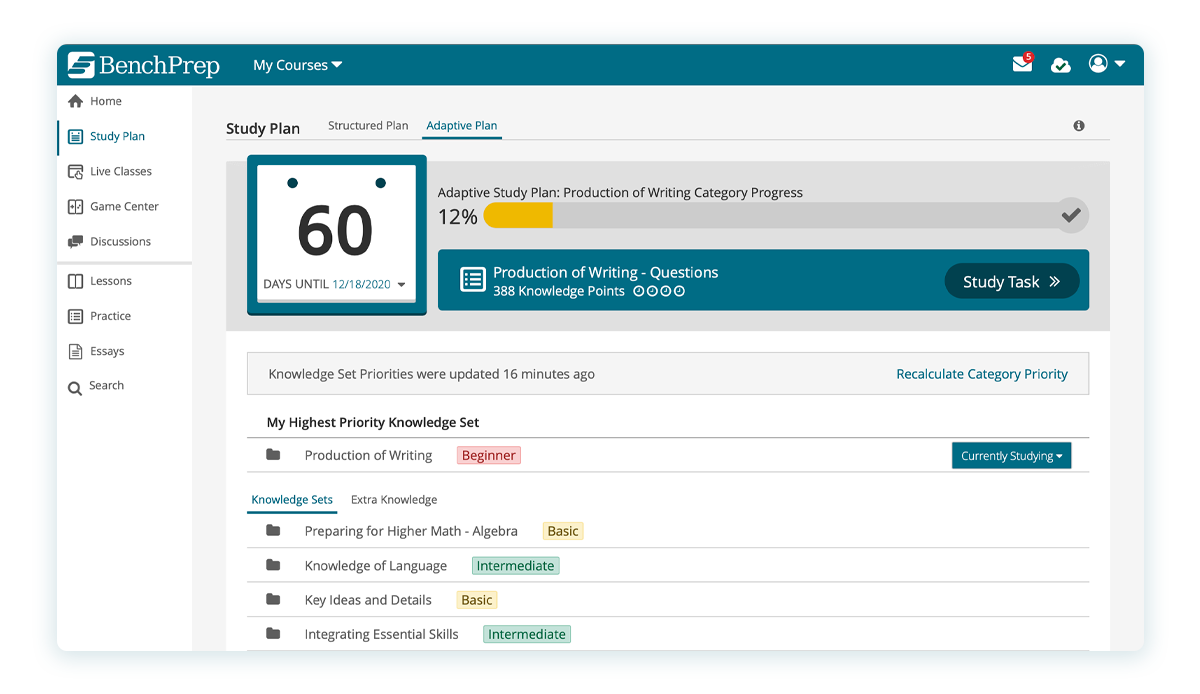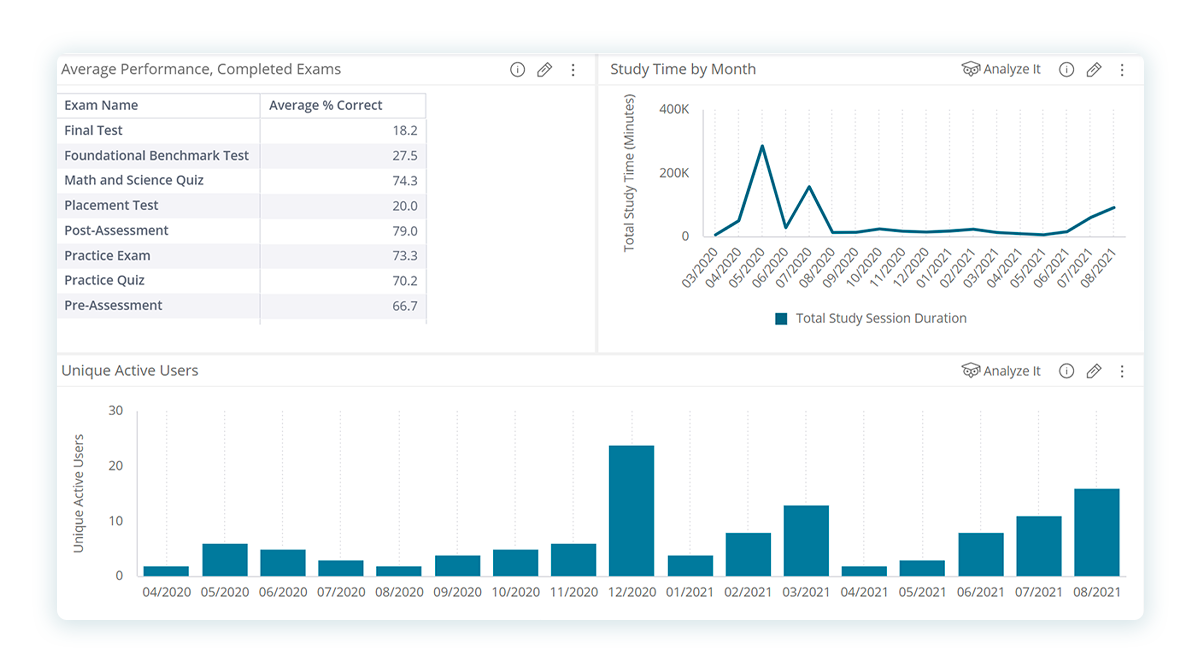3 Expert Strategies to Transform Your Certification Training Course with an LMS
The right LMS can transform your certification training course through varied course content, adaptive pathways, and effective data analysis.
However, exams can be costly and testing accessibility is often limited, so learners need to obtain the best results possible on their first attempt.
In fact, research shows that only 50% of students taking college admission exams, such as the SAT, opt to retake the exam.
This number reflects college admissions, however, if the rates are this staggering for a test determining something as crucial as access to college, one can imagine they’re even higher for professional certifications.
Considering the importance of passing the test the first time, it’s no surprise that many turn to a certification training course to get them ready for the big day.
But test prep options vary widely. Before the advent of online learning, most test prep involved in-classroom attendance, textbooks, and expensive 1:1 or small group tutoring services. However, nowadays learners have access to a range of digital tools. In an ever-on-the-go world, an online course run through an effective learning management system (LMS) may prove your best option.
This blog discusses why using an LMS is essential to creating a successful test prep training course. You’ll learn about expert strategies you can use to transform your test prep training program using an LMS.
What Does an LMS Offer?
As professional education continues on its digital transformation, an LMS can set your learners and instructors up for success by organizing course content in an efficient, logical, and personalized way.
Configurable, cloud-based learning tools are ideal for learners on the go who want to access content on their mobile devices. Your LMS can help keep all that content organized across devices and platforms and incentivize learners to participate.
An LMS can provide adaptive study plans, games, omnichannel accessibility, practice tests, and collaboration features to personalize your test prep training courses for every learner. Furthermore, an LMS democratizes education, eliminating barriers such as lack of funds, time, or motivation.
3 Expert Strategies to Transform Your Test Prep Training Course with an LMS
1. Leverage Adaptive Learning Pathways to Better Prepare Learners
No two learners are the same, and what works for one learner won’t necessarily work for another. Catering to individuals’ unique learning needs, methods, and lifestyles helps them achieve the best possible scores come exam time. This is where adaptive learning comes in.
Adaptive learning puts the learner in the driver’s seat, allowing them to progress at their own pace. It’s a personalized approach that empowers learners to study efficiently and perform better on exams. Using artificial intelligence to evaluate learners’ aptitudes and skills, adaptive learning tools curate customized scenarios and content. This ensures that learners receive the most relevant course content, adjusted according to their knowledge level and expertise.
This bespoke approach improves retention and recall—and since the pace is flexible, learners won’t feel overwhelmed or anxious. By cutting out irrelevant bits and targeting the most important course content for each student, adaptive learning also saves time.

The Most Successful LMS’ Offer Adaptive Learning Pathways
Any learning management system worth its salt will feature adaptive learning capabilities. Considering the on-the-go nature of professional learners, they need educational and test prep training programs that work with their lives.
What to Look For When Searching For an LMS
- Flexibility with Omnichannel Delivery - The system should allow for a range of options regarding where, when, and on which device to study.
- Interactivity - An LMS depends on data-driven systems that adjust content to learners’ preferences and change requirements in real time.
- Reporting and Analytics - Detailed analytics eradicates information gaps and identifies learners’ strengths and areas of opportunity.
- Visible Learner Performance Metrics - These metrics help organizations develop performance indicators for their learners, as well as future learners with similar learning styles.
2. Leverage Data to Improve Your Certification Training Program
While there are 800+ learning management systems on the market, some handle data better than others. An LMS that can take your business to the next level leans heavily on data. After all, you can’t refine or elevate your content to meet learner needs if what the learner needs is a mystery.
Alarmingly, nearly 73% of organizations fail to use their collected data in analytics systems.
Data is everywhere. It reveals patterns, trends, and correlations, helping you make future predictions. When it comes to a certification training course, data can advise on learner needs, behaviors, and motivators. It helps transform and personalize courses to meet learners where they are. However, gathered data is only as good as your ability to interpret and use it in your learning programs. When searching for an LMS, in-depth, easily accessible analytics is a must-have feature.
Improve Decision-Making With Real-Time Reporting and Analysis
- Track Key Performance Indicators - Single out areas for improvements, such as enrollments, satisfaction ratings, course completion rates, time spent engaging, and the number of views per course.
- Evaluate Direct Metrics - Determine the correct/incorrect answers to influence program design.
- Assess Question Difficulty - Determine whether questions in quizzes and practice tests are too difficult (or too easy), and make adjustments accordingly.
 3. Vary Your Digital Course Content to Engage Learners
3. Vary Your Digital Course Content to Engage LearnersThe best learning management systems offer a range of content delivery methods such as visual, audio, and text-based lessons to keep learners engaged. Delivery methods that integrate a healthy balance of active and passive learning and a variety of question types give learners relevant, value-driven content.
Use an LMS That Combines Active and Passive Learning Options
Just like in-person study, online courses work best with a combination of active and passive learning methods. However, the virtual nature of today's educational environment means you have to reevaluate what methods you use to strike that combination.
With instructor-centered passive learning methods, you integrate approaches such as audiovisuals, lectures, demonstrations, and self-directed study. Active learning methods, such as peer learning and virtual classroom polling, are also extremely beneficial to your learners. These methods are best used in conjunction, so it's important to find an LMS that offers multiple ways for learners to interact.
The Type of Questions You Ask In Your Online Certification Training Course Matters
The only way to know if someone has retained course material is to ask them. It’s the basic premise of testing—and of test prep. And while exams might be stocked full of simple ‘yes or no’ memorization questions, your course needs to dig into the weeds a bit more.
The best questions serve as a sort of active learning feedback loop. They reward the learner for getting an answer right and encourage them to seek out the right answers when they get them wrong. This stimulation encourages better information retention—which is just as important as getting a high score on exam day.
It's important for your LMS to provide a wide range of question styles in order to keep learners active and engaged with the material. In addition to your standard exam formats, varied question types help evaluate learners’ broader subject mastery, and provide feedback and resources for weaker subjects.
Side-by-side displays supply an in-depth look into questions and answers. In addition to your standard true-or-false or multiple-choice selections, essay prompts allow learners to put their knowledge into action. Essays encourage more critical thinking than a simple question-and-answer format, allowing learners to chart their own route to the solution. Further, interactive drag-and-drop questions force learners to assess and prioritize answers, understanding that solutions are more than just one static choice.
An LMS Can Help Your Certification Training Course Succeed
As education continues to migrate into the digital space, a learning management system is a must for programs that want to keep learners engaged and help them achieve their goals. Whether the goal of your business’ test prep program is to improve candidate readiness or to drive revenue back to the business, a well-organized digital course is essential.
An LMS can transform your traditional, classroom-bound certification training course into a highly effective eLearning program. But in order to do so, you need to choose an LMS that delivers on the demands of today’s decentralized learning environment. When looking for an LMS, search for features like adaptive learning pathways, comprehensive data analytics, and varied digital course content.
BenchPrep sets up your learners for success come exam time, no matter how or where they learn best. An omnichannel, data-driven platform chock-full of customizable content, BenchPrep’s learning management system helps revolutionize traditional test prep courses to accommodate today’s eLearning environment.






